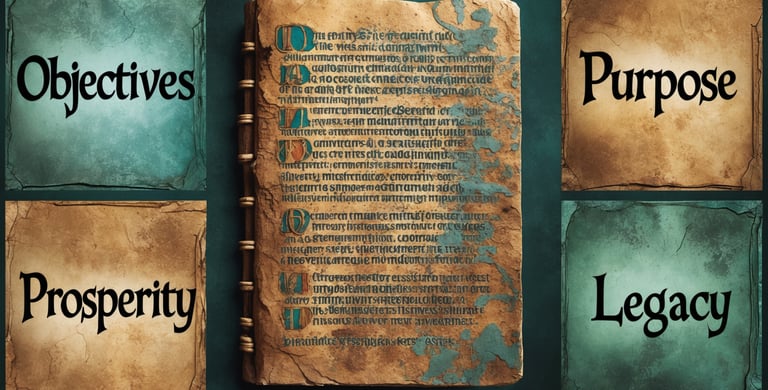The Ethics of Purpose
Building Your Mission on an Unbreakable Code
4FORTITUDEO - OBJECTIVES, PURPOSE, PROSPERITY, LEGACY
The Ethics of Purpose
Building Your Mission on an Unbreakable Code
“A good man out of the good treasure of his heart brings forth that which is good… for of the abundance of the heart his mouth speaketh.”
— Luke 6:45
Purpose Without a Moral Code Is Just Branded Self-Interest
Men are told today to “find their purpose.” But purpose alone is not virtue.
Without ethical constraint, a man’s mission becomes a mirror for ego—nothing more.
The tyrant has purpose.
The conman has purpose.
The manipulator of crowds and the violator of trust—they often have more clarity and consistency than most so-called good men.
Purpose, without code, is a loaded weapon in the hands of a child.
Real masculine purpose is not driven by productivity, success, or personal freedom. It is shaped, bounded, and sanctified by a transcendent ethical architecture—rooted in eternal law, not cultural fashion.
Marcus Aurelius wrote, “Waste no more time arguing what a good man should be. Be one.”
Confucius taught that virtue is the foundation of order, not the ornament.
And Christ made it clear: many will do mighty works in His name and be unknown to Him.
The point is not just to act with conviction—but to ensure your conviction is holy.
The Three Pillars of Ethical Purpose
1. Transcendence: Anchored Beyond Preference
Your purpose must answer to something higher than your feelings, your brand, or your ambitions.
It must serve a kingdom, not a mood.
It must be objective, not just internal.
It must withstand emotional weather, cultural tides, and generational drift.
Without transcendence, all ethics degrade into pragmatism.
Without fear of God, all strength becomes self-justifying.
2. Consistency: Behavior in Rhythm With Conviction
Ethics that change under pressure are not ethics. They are public relations.
The man of code behaves the same alone as in public.
He obeys the same standards when tired, tempted, or forgotten.
He does not require applause to remain aligned.
The righteous man is not perfect—but he is anchored. He errs, but he does not wander.
3. Consequences: Willingness to Pay the Price
Ethical purpose requires cost. It is not validated by ease.
You must be willing to suffer loss to remain aligned.
To lose influence rather than flatter.
To lose friends rather than deceive.
To lose momentum rather than betray order.
This is not martyrdom—it is integrity.
False Codes: What Modern Men Use Instead
Brand Ethics
The man builds a persona, then lives in fear of breaking it. His “purpose” serves the brand—not truth.Situational Ethics
His principles change based on audience, convenience, or perceived outcome. He calls this “wisdom.” It is cowardice in fine clothing.Emotional Ethics
He does what feels right. But feeling is not a compass. It is a reaction.
He is sincere—and completely unreliable.
The moment your purpose bends to mood, it ceases to serve anything greater than your ego.
Constructing Your Ethical Code
This is not about writing values for your website. It is about defining the spiritual laws you obey regardless of outcome.
Ask yourself:
Who do I serve, ultimately?
If it is not God, your ethics will eventually serve yourself.
What virtues must govern me under pressure?
Choose three that you will not betray: e.g., Truthfulness, Justice, Fortitude.
What am I willing to lose for this code?
If the answer is “nothing,” then it is not yet a code. It’s a suggestion.
Write a single paragraph—your “Unbreakable Code Statement.”
Let it govern your tone, your partnerships, your pace, your platform, your household.
Example:
“I will build slowly if I must, remain silent if I must, be forgotten if I must—but I will not violate truth to be seen, heard, or celebrated.”
Counterperspectives and Their Collapse
Objection: Sometimes you have to compromise a little to survive.
Response: That’s how integrity dies—inch by inch. The world does not need men who survive by erosion. It needs men who outlast by obedience.
Objection: But what if my principles limit my opportunities?
Response: Then your principles are real. If they cost you nothing, they were branding—not conviction.
Objection: Can’t I adjust my ethics as I grow?
Response: Growth sharpens ethics—but it doesn’t mutate them. If your values shift every season, they were never rooted in anything beyond you.
Tactical Embedding: Making Your Code Functional
Daily Ethical Preview
Each morning, ask:
What scenario today could tempt me to bend my code?
Where must I lead with truth even if it’s costly?
This is not negative thinking. It is pre-decision. Pre-fortification.
Weekly Integrity Audit
Each week, reflect:
Did I say anything that betrayed what I claim to believe?
Did I remain silent when I should have spoken?
If you fail, do not explain it away. Repent. Rewrite. Re-commit.
Teach the Code
If you have sons, disciples, or a team—name the code aloud.
Discuss it. Model it. Be held accountable to it.
A code kept secret is a code easily abandoned.
Wisdom and Warning
If you do not build your purpose on an ethical code:
Your strength will serve only your survival.
Your growth will come at the cost of your soul.
Your legacy will collapse under pressure.
If you do:
Your voice will gain weight without volume.
Your life will clarify others even when you are absent.
Your mission will become immune to manipulation.
The code is not a constraint. It is your crown.
Final Charge
You were not made to invent your own morality.
You were made to carry what is ancient, eternal, and unbreakable.
To obey it under pressure. To speak it when it’s costly. To die for it if necessary.
Purpose without obedience is seduction. Purpose with code is consecration.
Build your mission like a temple. Let every stone be submitted to the Law.
Write your vow in fire. Let no man, no mood, and no trend violate it.
Irreducible Sentence
When your mission kneels before your code, your legacy can stand.


